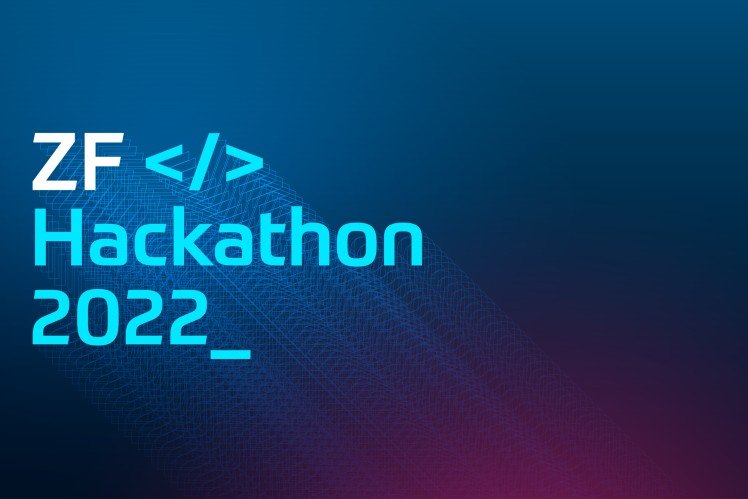ZF Hackathon at CES 2022: Speeding emergency response in smart cities wins among ideas shaping future mobility
After a 48-hour, caffeine-fueled session of intense brainstorming and coding, the closing bell rang on the first ZF Open-Source Mobility Hackathon. Held on January 7, the activity was conducted during this year’s Consumer Electronics Show (CES) in Las Vegas. A total of 170 participants from 20 countries registered to take part.

- ALTEN team wins $10,000 first prize and additional ZF support to help commercialize idea
- Proposal will help first responders reach emergencies faster
- Two other teams awarded cash prizes for their project ideas
- ZF activity demonstrates potential of open-source software solutions to improve the Next Generation of Mobility
While the competition was fierce, only one team could win the first prize of $10,000 plus a package of commercialization support from ZF. After reviewing the final team submissions, the jury of 10 voted ALTEN UK Innovation Lab the winner. Led by Samuel Fletcher from the United Kingdom, the ALTEN idea is aimed at helping first responders reach the scene of an emergency faster through smart traffic management.
“Congratulations to Samuel and the rest of the ALTEN team, and indeed to all of our Mobility Hackathon entrants. In the space of just 48 hours, these talented and determined individuals and teams from as far afield as El Salvador, Estonia, India and Egypt have demonstrated the power of software and agile thinking to drive transformation in mobility and beyond,” said Martin Fischer, Board Member and President of ZF Americas, speaking after the closing event on Friday: “We look forward to working with ALTEN and to help bring their exciting idea to fruition.”
Open to individuals, teams, start-ups, students, semi-professionals and professionals, the Mobility Hackathon is just one example of ZF’s innovative and collaborative software-first approach to solutions for the future of mobility. While some team entries were formed ahead of the Hackathon, ZF structured the event to facilitate team building and collaboration in real time using collaboration tools such as Microsoft Teams and wonder.me.
Overseen by Sebastian Grimm, Head of the ZF Innovation Lab, the ZF Mobility Hackathon was initiated to provide coders and software developers from around the world a platform to accelerate change in the mobility space with open source-based solutions.
“We have been really pleasantly surprised by the number of entries, the breadth and innovation of the ideas submitted, and the amazing potential they hold for the future of mobility,” said Grimm. “It was extremely difficult to select a winner from such a high-quality field. However, we felt that the idea by ALTEN UK is not only an excellent fit for ZF’s own strategy and thinking, but it also shows real-world potential for mobility users in the smart cities of the future.”
The winning entry from ALTEN UK was led by Samuel Fletcher (28), a Business Leader from Nottingham (UK). ALTEN’s idea, titled “Emergencies in Smart Cities,” aims to reduce the time it takes for emergency vehicles to reach the scene of an incident through the automated control of traffic signals and other infrastructure adjustments. Although led from the UK, the team of 8 also includes members from Brazil, Hong Kong, India and Kenya.
Based on a combination of open-source elements such as Traci (Traffic Control Interface), SUMO (Simulation of Urban Mobility) and Open Street Map, the feasibility demonstrator submitted by ALTEN impressed the ZF jury primarily for its compatibility with ZF’s Zero Accident strategy, as well as the combined use of V2I (Vehicle 2 Infrastructure) and V2V (Vehicle 2 Vehicle). Its potential to deliver true benefit to mobility users through faster emergency response times was a further major factor in the decision.
“We were thrilled to participate in this hackathon,” said Fletcher. “It was an intense 48 hours, but enormous fun for everyone involved to tackle challenges that have real-world applications! Through it we got the chance to learn new technologies ourselves and apply them to themes we hadn’t come across before. We’re hugely proud of what the team achieved and looking forward to how it can be developed in the future!”
Team Better Typed from Poland, led by Albert Lewandoski, was awarded second place in the competition. “The ZF Hackathon was a great event during which we were able to brainstorm and develop cutting-edge solutions,” said Lewandoski. “The main idea behind the project is to build a common ecosystem for B2C (business-to-consumer), B2G (business-to-government) and B2B (business-to-business), and show the potential of the Smart City 3.0 for everybody with the support of Web 3.0 technologies.”
In third place was team Oversight from Germany, who developed a cybersecurity dashboard that can help speed the identification of critical software gaps in vehicles already in customer hands. The solution evaluates freely available communication data from forums, social media and elsewhere with the help of certain trigger words.
Addressing participants at the start of the Mobility Hackathon, Martin Fischer pointed out that ZF’s business collaboration strategy is not limited to larger companies. “We firmly believe that to create safe, clean, efficient, comfortable, and affordable mobility for everybody, every contribution counts,” said Fischer. “That is why we are open to joint development, and actively collaborate with many players in the industry and appreciated the exciting innovations presented in the Hackathon.”
Due to the positive response and the lively participation, a follow-up of the hackathon for CES 2023 is already planned.
www.zf.com

